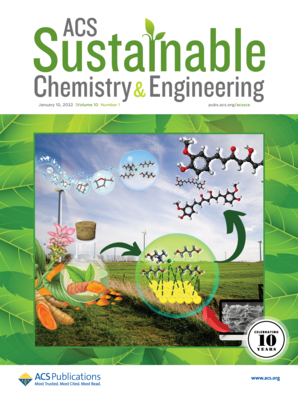Supramolecular Deep Eutectic Solvents and Their Aqueous Solutions: Green Carriers for Essential Oils
IF 7.1
1区 化学
Q1 CHEMISTRY, MULTIDISCIPLINARY
引用次数: 0
Abstract
In the search for alternatives to synthetic chemicals and drugs, there is growing interest in the aromatic and biological properties of essential oils. However, essential oils and their constituents are poorly soluble in aqueous systems and are highly sensitive to degradation and evaporation. Here, we evaluated the applicability of supramolecular deep eutectic solvents (SUPRADES) based on naturally occurring l-lactic acid (LA) and four cyclodextrins (CDs) as carriers for two essential oil components, 3-carene and limonene. The obtained partition coefficient in water was 1200 times higher than that in SUPRADES, which indicated that SUPRADES has a remarkable enhancing effect on the dissolution of the two essential oils. Adding water could significantly reduce the viscosity of SUPRADES and effectively control the release of essential oils. Evidence for a randomly methylated β-CD–3-carene inclusion complex was provided by molecular dynamics simulation. In addition, the formation of the inclusion complex is enhanced by increasing the water content within a specific range. Furthermore, the formation of SUPRADES is attributed to hydrogen bonds between the hydroxyl groups on CDs and LA. In particular, the van der Waals interaction plays a major role in the dissolution of 3-carene. Overall, SUPRADES and their aqueous solutions are promising carriers for essential oils due to their strong inclusion ability and controlled release.

超分子深共晶溶剂及其水溶液:精油的绿色载体
为了寻找合成化学品和药物的替代品,人们对精油的芳香和生物特性越来越感兴趣。然而,精油及其成分在水性体系中的溶解度很低,而且对降解和蒸发非常敏感。在此,我们评估了超分子深共晶溶剂(SUPRADES)的适用性,该溶剂基于天然的 l-乳酸(LA)和四种环糊精(CD),可作为 3-蒈烯和柠檬烯这两种精油成分的载体。所得的水分配系数是 SUPRADES 的 1200 倍,这表明 SUPRADES 对两种精油的溶解有显著的促进作用。加入水可以大大降低 SUPRADES 的粘度,有效控制精油的释放。分子动力学模拟提供了随机甲基化的β-CD-3-蒈烯包合物的证据。此外,在特定范围内增加含水量可促进包合物的形成。此外,SUPRADES 的形成归因于 CD 和 LA 上羟基之间的氢键。特别是,范德华相互作用在 3-蒈烯的溶解过程中发挥了重要作用。总之,SUPRADES 及其水溶液具有很强的包合能力和控释性,是很有前景的精油载体。
本文章由计算机程序翻译,如有差异,请以英文原文为准。
求助全文
约1分钟内获得全文
求助全文
来源期刊

ACS Sustainable Chemistry & Engineering
CHEMISTRY, MULTIDISCIPLINARY-ENGINEERING, CHEMICAL
CiteScore
13.80
自引率
4.80%
发文量
1470
审稿时长
1.7 months
期刊介绍:
ACS Sustainable Chemistry & Engineering is a prestigious weekly peer-reviewed scientific journal published by the American Chemical Society. Dedicated to advancing the principles of green chemistry and green engineering, it covers a wide array of research topics including green chemistry, green engineering, biomass, alternative energy, and life cycle assessment.
The journal welcomes submissions in various formats, including Letters, Articles, Features, and Perspectives (Reviews), that address the challenges of sustainability in the chemical enterprise and contribute to the advancement of sustainable practices. Join us in shaping the future of sustainable chemistry and engineering.
 求助内容:
求助内容: 应助结果提醒方式:
应助结果提醒方式:


